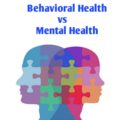Behavioral healthcare is the maintenance or improvement of emotions, behaviors and biology relating to a person’s mental well-being via the prevention, diagnosis, treatment, recovery, or cure of disease, illness, injury, and other physical or emotional impairments so as to restore their ability to function in everyday life and their concept of self.
A person struggling with his or her behavioral health may face stress, depression, anxiety, relationship problems, grief, addiction, ADHD or learning disabilities, mood disorders, or other psychological concerns. Counselors, therapists, life coaches, psychologists, nurse practitioners or physicians can help manage behavioral health concerns with treatments such as therapy, counseling, or medication.
Many people are struggling with issues that fall under the behavioral health category. Some dealing with issues such as mental health challenges aren’t getting the treatment required, or they lack the necessary resources. For example, an estimated 44 million adults are living with mental illness – yet only 40 percent are actively receiving treatment.
There is also a growing amount of research suggesting that behavioral health and physical health are closely related. Sixty-eight percent of adults with mental health disorders also struggle with medical conditions. Some of these conditions are chronic, and the cost of managing these conditions is high. The cost of managing the physical health of a patient with an underlying behavioral issue is estimated to be three times more than that of a patient without these challenges. Chronic health conditions account for 81 percent of all hospital admissions, 91 percent of all prescriptions filled and 76 percent of all physician visits.
The upside is that employers can play a large role in getting people the care that they need through behavioral health services. An increasing number of employers understand the importance of these programs and work to connect the right programs and services to the employees who need them most. At the same time, resources are being reimagined in the arena of behavioral health and substance abuse prevention, which provides greater efficiency and decreased costs.
The Difference Between Behavioral Health and Mental Health
Many people are more familiar with the term, “mental health.” Mental health covers many of the same issues as behavioral health, but this term only encompasses the biological component of this aspect of wellness. The term, “behavioral health” encompasses all contributions to mental wellness including substances and their abuse, behavior, habits, and other external forces.
A Breakdown of Behavioral Health Services
The variety of services available to employees who need help has expanded in recent years. These services are targeted to help people live healthier lives in regard to their mind, body and overall health. There are a variety of services that a person might need depending on his or her individual challenges. One person may need help with substance abuse, while another may be managing bipolar disorder – and another might need help with marital problems.
The services are targeted to assist with a variety of issues – everything from depression to anxiety to diabetes management, weight loss, drinking, and drug use and much more. The issue a person is facing will determine which type of healthcare provider and service is most relevant. Examples of services that an employee can tap into through a behavioral health program include the following.
Psychiatrists. These providers can help with a variety of challenges, from child and adolescent psychiatric issues to geriatric psychiatry to addiction psychiatry. These providers can write prescriptions to assist with the healing process if required by the patient’s condition.
Psychologists. These providers are trained in the science of psychology and work in a clinical, counseling or research setting. They work to diagnose and offer psychotherapy to assist with healing the patient’s condition.
Social Workers. These professionals can provide a wide variety of services, usually in administrative positions within programs and institutions to assist people. For example, there are medical and health social workers, child, family, and school social workers, and mental health and substance abuse social workers, just to name a few areas in which these individuals work.
Licensed Professional Counselors. These counselors typically specialize in psychotherapy to assist with a patient’s condition. These professionals may focus on specific behavioral health areas, such as marriage issues or substance abuse. LPCs typically don’t provide a formal diagnosis or prescribe medications.
Behavioral health services are designed to treat the underlying cause(s) of a specific behavior. For example, in the field of suicide prevention, the practitioner won’t only want to prevent the behaviors that may result in suicide but also to understand the underlying causes of those behaviors to help the patient in the long term.






